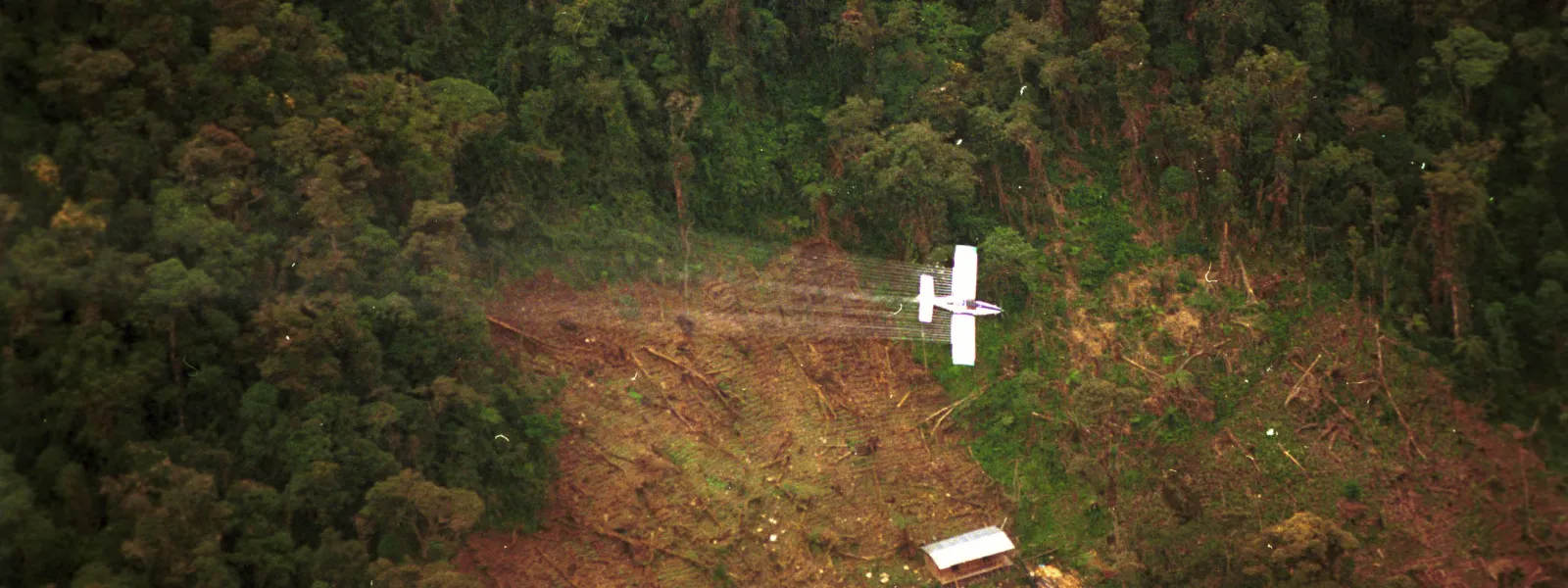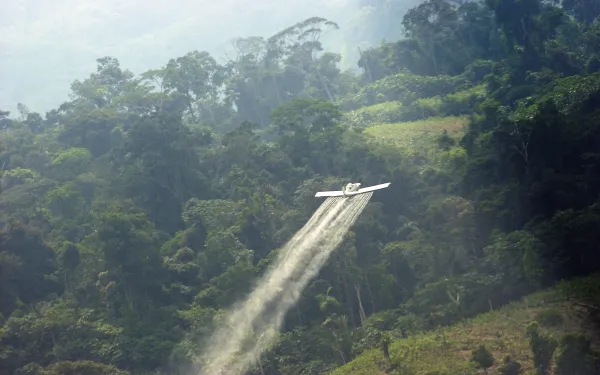
Project
Victory: Aerial Spraying Stopped in Colombia
For 15 years beginning in 2000, the United States and Colombia sent airplanes to spray toxic pesticides over Colombian coca and poppy fields. The multi-million-dollar program was called Plan Colombia.
The pesticides drifted over homes, vegetable fields, livestock, rivers, and forests. Indigenous and other people who lived in the area suffered health problems, as did fish, amphibians, rodents, insects, and plants. Entire families left their land because of the spraying.
After a decade and a half of spraying, cultivation of coca and poppy crops remained as widespread as ever.
During those years, AIDA collaborated with many organizations, institutions and individuals to:
- Inform authorities in Colombia and the United States of the social and environmental damages Plan Colombia caused;
- Request more thorough environmental and health assessments;
- Bring an end to spraying in Colombia’s natural parks and on the Ecuadorian border;
- Document environmentally sustainable projects that are more effective at curbing cultivation of illicit crops;
- Present to Colombia’s Constitutional Court two technical reports about the environmental and public-health impacts of aerial pesticide spraying – which helped convince the court to rule in favor of people harmed by the spraying in two court cases.
In April 2015, the World Health Organization classified glyphosate, the main pesticide used, as probably carcinogenic to humans. On the basis of this decision, Colombia’s Ministry of Health recommended suspension of spraying operations to the Ministry of Justice.
Within weeks, AIDA and partners gathered almost 25,000 signatures on a citizens’ petition to urge the National Narcotics Council to suspend spraying – which it did in May 2015.
The National Environmental Licensing Agency made that decision final when it revoked authorization of the spraying program in September 2015.
Related projects
Latest News

Colombian Court Orders the Suspension of Plan Colombia Spraying
FOR IMMEDIATE RELEASE: June 26, 2003 CITING RISK TO HUMAN HEALTH AND THE ENVIRONMENT, COLOMBIAN COURT ORDERS THE SUSPENSION OF THE US-FINANCED SPRAYING OF COCA AND POPPY CROPS OAKLAND, CA/BOGOTA, COLOMBIA – A recent decision by the Superior Administrative Court of Cundinamarca, Colombia, (released to the public on June 25) declared that the aerial spraying with herbicides to eradicate coca and poppy crops violates the Colombian constitutional rights to a healthy environment, security and public health. As a result, the court ordered that the aerial spraying of potent glyphosate herbicides be suspended until the government complies with the Environmental Management Plan for the eradication program, and conducts a series of required studies intended to protect human health and the environment. This verdict supplements earlier declarations by the Colombian Constitutional Court and the State Council, which respectively ordered the suspension of spraying in indigenous territories and full compliance with the Environmental Management Plan approved by the Ministry of Environment. According to Yamile Salinas of the Colombian Ombudsman’s Office, “This ruling recognizes the potential risks that the herbicide and the manner in which it is being applied pose to human health and the environment in Colombia,” She added that, “The application of the precautionary principle is of singular importance because the Court affirms that the significant and potentially irreparable risk posed by the spraying is reason enough to suspend the fumigation program.” “The US Congress has required the State Department to evaluate environmental and health impacts of Plan Colombia. This decision by a court in Colombia must be taken into account by the US State Department,” said Anna Cederstav, staff scientist with Earthjustice and AIDA. “In light of the evidence presented and the court’s clear decision on this matter, the Department of State cannot certify to Congress that the herbicide mixture, in the manner it is being used, poses no unreasonable risks or adverse effects to humans or the environment, or that the herbicide is being used in compliance with the Environmental Management Plan for the program.” She concluded that, “It would be highly irresponsible for the United States to continue the eradication program in contravention of the Colombian court order to suspend the spraying until appropriate public health and environmental protections are in place.” “This court order formally adopts many of the requirements for environmental and human protection that the Colombian Ombudsman and Comptroller General, along with both national and international non-government organizations, have been demanding for years,” said Yamile Salinas. “This decision is a victory for both public health and the environment of Colombia.” Press Contacts: Anna Cederstav, Staff Scientist with Earthjustice and AIDA, (Oakland, CA) tel. 510-550-6700 Yamile Salinas, Colombian Ombudsman’s Office, (Bogotá, Colombia) tel. 571-314-7300 Ext. 2324
Read more